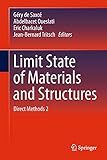Limit State of Materials and Structures [electronic resource] : Direct Methods 2 / edited by G�ery de Saxc�e, Abdelbacet Oueslati, Eric Charkaluk, Jean-Bernard Tritsch.
Contributor(s): Saxc�e, G�ery de [editor.] | Oueslati, Abdelbacet [editor.] | Charkaluk, Eric [editor.] | Tritsch, Jean-Bernard [editor.] | SpringerLink (Online service).
Material type: BookPublisher: Dordrecht : Springer Netherlands : Imprint: Springer, 2013Description: VIII, 220 p. online resource.Content type: text Media type: computer Carrier type: online resourceISBN: 9789400754256.Subject(s): Engineering | Computational intelligence | Continuum mechanics | Engineering design | Civil engineering | Engineering | Continuum Mechanics and Mechanics of Materials | Engineering Design | Civil Engineering | Computational IntelligenceAdditional physical formats: Printed edition:: No titleDDC classification: 620.1 Online resources: Click here to access online
BookPublisher: Dordrecht : Springer Netherlands : Imprint: Springer, 2013Description: VIII, 220 p. online resource.Content type: text Media type: computer Carrier type: online resourceISBN: 9789400754256.Subject(s): Engineering | Computational intelligence | Continuum mechanics | Engineering design | Civil engineering | Engineering | Continuum Mechanics and Mechanics of Materials | Engineering Design | Civil Engineering | Computational IntelligenceAdditional physical formats: Printed edition:: No titleDDC classification: 620.1 Online resources: Click here to access online The Ratchet Limit -A Coupled Dual Minimisation Problem -- Decomposition methods and strain driven algorithms for limit and shakedown -- Shakedown and optimization analysis of periodic composites -- An upper bound algorithm for limit and shakedown analysis of bounded linearly kinematic hardening structures -- An edge-based smoothed finite element method for primal dual shakedown analysis of structures under uncertainties -- Interior-point method for lower bound shakedown analysis of von Mises-type materials -- Numerical analysis of nonholonomic elastoplastic frames by mathematical programming.-  Inelastic behavior of a two-bar system with temperature-dependent elastic modulus under cyclic thermomechanical loadings.-  A multiphase model for assessing the overall yield strength of soils reinforced by linear inclusions.-  Limit analysis of a soil reinforced by micropile group: a decomposition approach.- An extension of Gurson model to ductile nanoporous media.
To determine the carrying capacity of a structure or a structural element susceptible to operate beyond the elastic limit is an important task in many situations of both mechanical and civil engineering. The so-called "direct methods" play an increasing role due to the fact that they allow rapid access to the request information in mathematically constructive manners. They embrace Limit Analysis, the most developed approach now widely used, and Shakedown Analysis, a powerful extension to the variable repeated loads potentially more economical than step-by-step inelastic analysis. This book is the outcome of a workshop held at the University of Sciences and Technology of Lille. The individual contributions stem from the areas of new numerical developments rendering these methods more attractive for industrial design, extension of the general methodology to new horizons, probabilistic approaches and concrete technological applications.


There are no comments for this item.